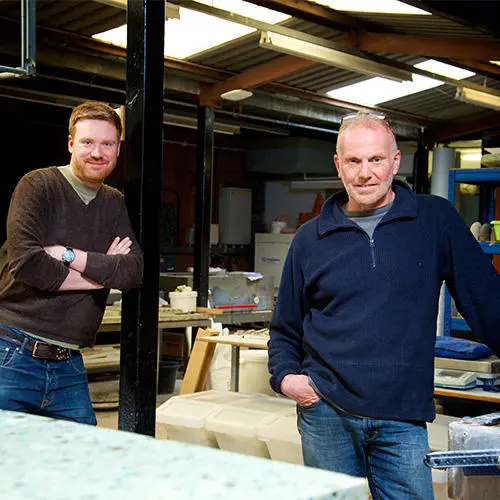Funding will transform production capacity for surfaces company
The University of Central Lancashire’s (UCLan) first spin-out business has raised £1.34 million to support the design, planning and location of a new factory to transform its production capacity.
Alusid uses a patented process to manufacture sustainable, high-quality building materials by recycling industrial waste ceramics and glass, which would otherwise go to landfill. Products are sold under the brand name SilicaStone.
The company began from a research project between Professor David Binns and Dr Alasdair Bremner, to promote how designers can be more sustainable and environmentally responsible.
The fundraising has been supported by new and existing investors, including Frontier IP. The Group has converted a £348,000 loan into new equity in Alusid.
It values the company at £4.86 million, meaning Frontier IP’s 35.6 per cent stake is worth £1.73 million, up from the previous valuation of £700,000 for the 39 per cent held pre-fundraising. The funding round remains open for further investment up to a total of £1.75 million until December 31, 2018.
Currently, Alusid makes table tops, tiles and other surfaces through a batch process using three kilns at its plant in Preston, Lancashire.
The proceeds of the fundraising will be invested in developing a new factory based on a continuous flow process, where products are fired by being fed onto a conveyer belt system, called a roller hearth tunnel kiln, in a steady stream.
The move follows the successful testing of a pilot production line with world-leading Italian ceramic equipment company, Sacmi Group, which will also help to design the new factory. The Alusid process means the factory will be much more energy efficient than those used for making conventional tiles.
"This is a massive validation of our research which started out as a project to promote how designers could be more sustainable and environmentally responsible."
The plant is expected to start production in 2020. Once in operation, Alusid’s capacity will rise from 4,000m2 a year to 30,000m2 a month, based on a single line producing tiles. Currently, it is estimated the cost of building a factory is about £10 million. Options being explored to finance the build include an initial public offering.
Dr Alasdair Bremner, co-founder and chief operating officer of Alusid, said: “The building industry is increasingly looking for innovative sustainable products such as SilicaStone. This successful fundraising will enable Alusid to move to the next stage in development where we can really capitalise on the economies of scale coupled with lower energy and material costs.”
Professor David Binns added: “This is a massive validation of our research which started out as a project to promote how designers could be more sustainable and environmentally responsible. This new funding will enable Alusid to scale up its production processes and enable us to meet the demand from interested customers.”
Neil Crabb, chief executive of Frontier IP, said: “We’re delighted with the success of the Alusid funding round and the belief shown by investors in the potential of the company. With consumers increasingly focused on sustainability and the impact of waste on the environment, we are confident that Alusid has a very bright future.”
Alusid is attracting strong interest, and currently has more than 100 projects in its pipeline. SilicaStone buyers include Amazon, Four Seasons Hotels, Nando’s and Wells Fargo bank, which is using the material in its prestigious new London HQ. The company won this year’s Jonathan Hindle prize for outstanding design in 2D materials, awarded by the Furniture Makers’ Company.
The company is also actively exploring opportunities for international expansion, either through licensing or establishing joint ventures. Initial interest has been expressed by organisations in the United States, China and Portugal.
Allenby Capital Limited acted as broker to Alusid in connection with the funding round.


